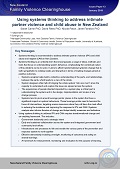 Issues Paper 13, January 2019
Issues Paper 13, January 2019
Authors: Sarah Carne1, PhD, David Rees2, PhD, Nicola Paton3 and Janet Fanslow4 PhD
1 Independent researcher
2 Synergia Ltd
3 Manager/Community Lead, New Zealand Family Violence Clearinghouse
4 Associate Professor, Social & Community Health, School of Population Health, University of Auckland; Co-Director, New Zealand Family Violence Clearinghouse
Downloads
Key Messages
- Systems thinking is recommended to address intimate partner violence (IPV) and child abuse and neglect (CAN) in New Zealand.
- Systems thinking is an umbrella term that encompasses a range of ideas, methods and tools that focus on understanding system behaviour, emphasising the contextual nature of the problems we try to solve. It aims to affect transformational systemic change that is both sympathetic to existing needs and disruptive in terms of making changes aimed at positive outcomes.
- Systems analysis helps build a collective understanding of the parts, and relationships between the parts, which leads to a view of the whole.
- System designers often talk of bringing the whole system “into one room” since the capacity to understand and explore the issue are spread across the system.
- The experiences of people directly impacted by a system play a critical part in understanding the system and in the design, implementation and review of any change process.
- Systems tend to pivot around leverage points: places in the system that have a significant impact on system behaviours. These leverage points need to become the focus of interventions, targeting scarce resources where they will have the most effect in reducing the incidence and improving the response to IPV and CAN. Systems analysis also informs theories of change and helps identify measures and indicators.
- Using systems thinking to address IPV and CAN requires transformational change and an enabling framework. This includes:
- Government leadership and a strategic intent
- Early and sustained collaboration across the system and integrated government and ccommunity level efforts
- Infrastructure and processes to link and enable the various parts of the prevention and response system to work together
- Effective stewardship including oversight, monitoring of outcomes and acting on shared learnings
- A framework for measurement, monitoring and evaluation for the purpose of learning.
Recommended citation
Carne, S., Rees, D., Paton, N., & Fanslow, J. (2019). Using systems thinking to address intimate partner violence and child abuse in New Zealand. Auckland, New Zealand: New Zealand Family Violence Clearinghouse, University of Auckland.
ISSN: 2253-3222, published online only.
Feedback
The Clearinghouse welcomes your feedback. Please email us - we would love to hear your comments on this issues paper.


